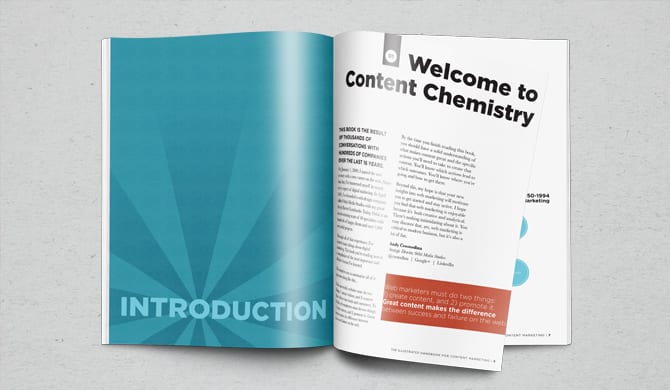“It depends.” What a totally unsatisfying answer. Of course it depends. But there are rules of thumb. There is research. We can analyze what works and draw conclusions. We can create guidelines, especially for things that are measurable. Like length.
Here are guidelines for length for ten types of content. Most of these are compiled from studies that analyzed the high-performers. Take a look:
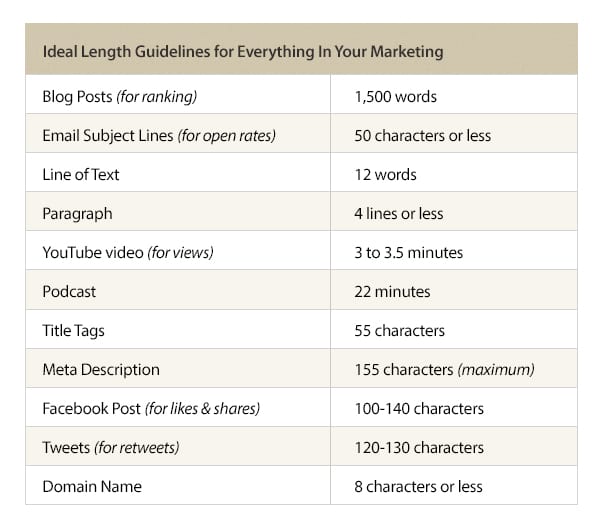
Now that you’ve got the data, let’s look at the research…
Ideal Blog Post Length for SEO
Blog posts vary in length from a few short paragraphs to 40,000 words. If your goal is search engine traffic, longer is better.
When serpIQ analyzed high ranking pages, they found more text correlates with high rankings.
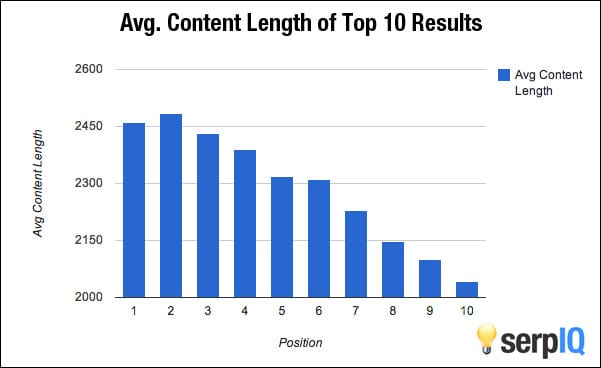
(source: Serp IQ)
On this chart, “content” includes navigation, sidebar content, and other page elements, so the numbers here look slightly higher than the recommended blog post length.
Think about it this way: Google is a research tool. Longer pages have more opportunities to indicate their relevance. Google sees longer pages as more likely to contain the answer to the searcher’s question.
Another reason is links. When MOZ analyzed 3,800 posts on their own blog, they found that the longer posts get linked to more often. Longer pages generally attract more links, and these links support a higher rank.
The ideal length for a search optimized blog post is 1,500 words.
Related Post: How Often Should I Blog?
Ideal Length for an Email Subject Line
Surprisingly, the length of an email subject line doesn’t have a big impact on open and clickthrough rates. According to a study by MailChimp, shorter subject lines perform only slightly better.
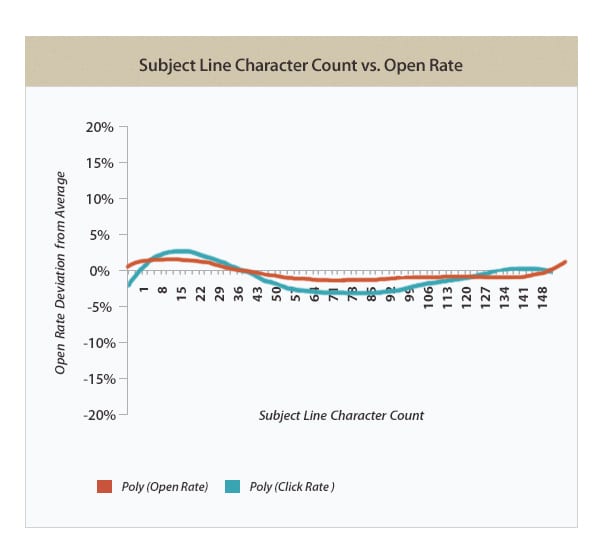
Even if the benefits are in the single digits, most experts would say shorter is better. Especially mobile recipients, longer subject lines get truncated when viewed on a phone.
The ideal email subject line is 50 characters or less.
Ideal Line Length
It’s because of the biology of the human eye.
According to the Web Style Guide, the field of vision for readers is only a few inches. If a line of text is too long, the reader needs to use more muscles in the eye and neck. It takes more work to travel all the way across a long line of text, back and forth, over and over. Readers are more likely to lose their place. This slows reading rates and comprehension.
Since the length of a line of text is typically determined during the web design process, if you want to change it, you may need to have your web designer tweak your “CSS files.”
The ideal length for a line of text is 12 words.
Ideal Paragraph Length
When you open a book, you expect to hit a wall of text. But books don’t have back buttons. On the web, long paragraphs are a problem.
Website visitors are often scanners. Short paragraphs let them get the meaning in short bursts. Many (even most) visitors scan down the page, glancing at headers and sub-headers, then dive deeper into the paragraphs if something catches their interest.
“Short paragraphs get read, long paragraphs get skimmed, really long paragraphs get skipped.”
– Jason Fried
Designers know that visitors love whitespace, but somehow, writers didn’t get the message. Don’t write walls of text. Break up paragraphs to create white space on the page.
The ideal length for a paragraph is 3 to 4 lines maximum.
Ideal Length for a YouTube Video
Some YouTube videos are hundreds of hours long …but they’re not very popular. The most popular videos are pretty short.
When David Waterhouse analyzed the length of the top 50 YouTube videos he found the average length was 2 minutes 54 seconds. Clinton Stark reported that Google researchers from the YouTube team confirmed this recommended length.
Why are short videos popular on YouTube? Consider this:
-
YouTube is the second most popular search engine in the world
-
The percentage of viewers who watched the entire video is a ranking factor
So if it’s very long, fewer viewers may watch the entire video, which could cause it to rank lower, be discovered less often, and be less popular.
The ideal length for a YouTube Video is 3 to 3½ minutes.
Ideal Length for a Podcast
The length of podcasts ranges almost as much as YouTube videos. Some popular podcasts are 60-seconds; others are several hours. The top 10 business podcasts range from 15 minutes to an hour, averaging 42 minutes.
According to research by Stitcher, the average podcast listener stays connected for 22 minutes on average.
This number isn’t surprising. Studies cited in the National Teaching and Learning Forum show that students zone out after 15-20 minutes of lecture time. After 20 minutes, attention and retention rates crash.
The ideal length for a podcast is 22 minutes.
Ideal Length for a Title Tag
Besides the blog post itself, there are a few other parts of the page that affect SEO. The most important of these is the title tag. Why so important? The title tag becomes the link when the page ranks in Google.
According to recent research by Dr. Pete over at Moz, the title tags guidelines have changed due to the redesign of Google’s search results. Using the new title tag preview tool, this is what your title tag will look like:
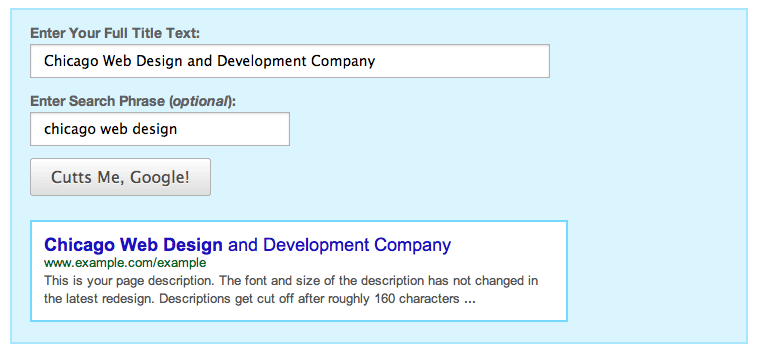
If a title is too long, it gets truncated, and people won’t be able to read it all. The cutoff point is around 60 characters. So use the target keyphrase once and keep it short. See Orbit’s SEO Best Practices for more info.
The ideal length for a title tag is 55 characters.
Ideal Length for Meta Description
As with the title tag, the meta description is visible in search results and it gets cut off if it’s too long.

It should be a single sentence in plain English, summarizing the content of the page. Use the target keyphrase once and don’t make it too long. See Orbit’s Content Checklist for more info.
The ideal length for a meta description is 155 characters.
Ideal Facebook Post Length
According to research by Track Social, shorter Facebook messages get more engagement. Here’s the correlation between length and likes:
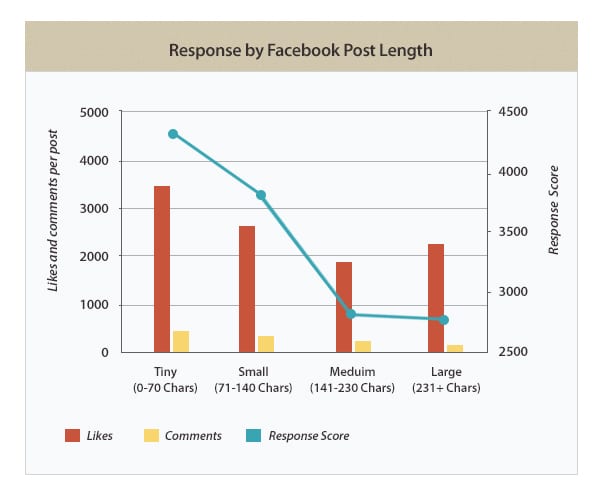
Length isn’t the only factor, or even the most important factor; Facebook posts with images get four times as much response as posts without! But, if a Facebook post is longer than the longest tweet (140 characters), response rates drop off fast.
The ideal length for a Facebook post is 100 to 140 characters.
Ideal Length of a Tweet
So, if Facebook posts should be as long as tweets, than 140 characters is a good length, right? Actually, that might not be true.
Dan Zarrella analyzed 200,000 tweets with links to see if length correlated with high clickthrough rates. It does. Longer tweets tend to get more clicks, but the maximum 140 characters wasn’t the highest. The peak looks to be around 120 to 130 characters:
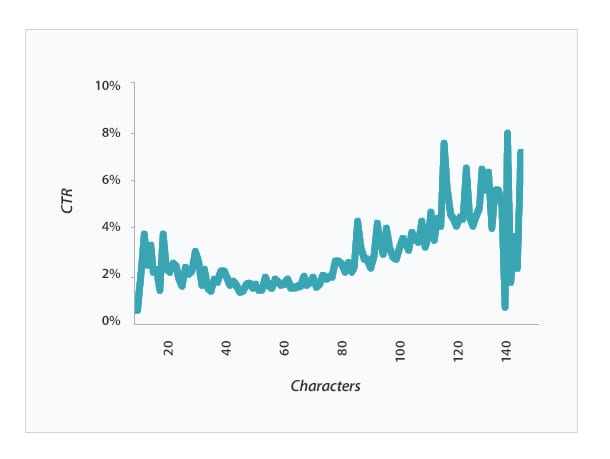
The ideal length for a tweet is 120 to 130 characters.
Big Picture Bonus: Ideal Length for a Domain Name
Like everything else on your site, your domain is either long or short. And just like everything else, length has a correlation with popularity. Here, shorter is better.
If you look at the top 250 websites on the Internet, the average number of characters in their domains is 7.15. That’s pretty short.
Here’s data from a study conducted by Daily Blog Tips. The red line shows the average.

More than 70% of these domains are eight characters or fewer. Also, 86% were .com domains. What does this tell us?
The ideal length for a domain name is 8 characters. Great domains are short, .com extensions and easy to remember.
The Ultimate Rule for Content Length
These are guidelines, not rules. Making it longer or shorter doesn’t guarantee failure; making it exactly these lengths doesn’t guarantee success. Even this post and it’s corresponding email didn’t follow each guideline exactly!
There’s really only one hard, fast rule for content length and it goes like this:
Every piece of content should be as long as it takes to convey the message, and no longer.
That’s the long and the short of it. Comments and questions are welcome, as always. Ideal comment length is 12-15 words.
Related Post: Does Word Count Matter for SEO? Debunking a Viral Study




